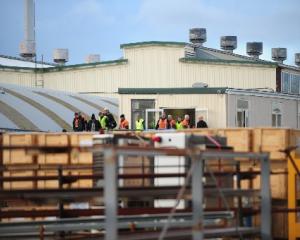Union stalwart Jim Kelly has been the "face" of the Rail and Maritime Transport Union (RMTU) as national president for the past 21 years - in fact he has been the RMTU's only president since its inception.
"You came to Hillside and wanted to join the union; then you met me," says Mr Kelly, who has been at Dunedin's Hillside workshops for 29 years.
It is hardly surprising Mr Kelly, the son of a communist shipyard worker from Glagow's tough streets, pulls no punches about the past 29 years of active unionism since arriving in New Zealand as a 34-year old in 1982.
Affable and talkative, at first glance he appears to be of the old-school unionist mold.
However, his experiences of privatisation, asset stripping, mass redundancies and the demise of his much loved railways industry bespeaks a different era of unionism.
That was the era of unions fighting corporates and the introduction of the right-wing legislation required to bring about free market economies and eventually globalisation.
Mr Kelly was exposed at an early age to the politics of his father. He recalls being dragged around the byways of Glasgow by his crane-driver father "painting slogans in the streets", which turned him into "a bit of a socialist".
"While all the other kids would be going to church on a Sunday I'd be at the Socialist Sunday Service singing the Red Flag," he quipped.
Mr Kelly (63), a trained motor mechanic, has been working at Hillside for 29 years as a fitter and turner, and, while nearing retirement, hopes to be able work for another three years or so.
When he started there were 25,000 railway staff throughout the country and five workshops. Now there are about 5500 employees and two workshops; the latter vying for their very survival as New Zealand's leaders embrace the wares from cheap labour economies.
The privatisation of railways and Employment Contracts Act eras remain as "bitter" and "distraught" times, when corporate owners scythed through thousands of jobs and sold assets.
In 1993, Crown-owned New Zealand Rail Ltd was sold to Tranz Rail Holdings, a consortium of Fay Richwhite and Co, Wisconsin Central Transportation Corp and Berkshire Partners Ltd for $328 million. The company carried $100 million equity and $300 million of debt at the time.
Within less than two years, Tranz Rail returned almost $100 million to the consortium, after selling assets and rationalising employees, then listing Tranz Rail and raising $175 million, most of which was used to pay debt.
Michael Fay and David Richwhite amassed a fortune during the mid 1980s to mid 1990s when the country was enmeshed in bitter deregulation and asset sales. Before decamping to Switzerland, their deals were to become scrutinised closely, including an insider trading case relating to Tranz Rail where they met most of a $27.4 million settlement.
Mr Kelly was at the cutting edge of many redundancies during that period, including the demise of Hillside's workforce from near 700 employees to a low of 113 in the early 1990s, and the closure of Otahuhu workshop in Auckland where once 250 people worked.
"The workshop was making a profit and they . . . closed the place down. Even the manager didn't know the day before." Mr Kelly recalls the anguish and dumbfounded anger of the staff.
"Grown men were crying. It was the only job they had known since school; [they had followed] in their fathers' footsteps and at 55 [years old] they were finished." Mr Kelly remembers only one outright strike during his time, when an "absolute insult" of a 1.5% pay rise offer was on the table at a time the stock exchange shares during rail privatisation were moving through $9 each.
However, a 24-hour national strike which ground all rail movements to a halt resulted in a 5.5% offer being tabled and accepted "shortly after", he said.
Mr Kelly, who has got through recent health issues, is stepping aside from any further RMTU executive roles and will be replaced by Tauranga port worker Aubrey Wilkinson as its national president. Mr Wilkinson joins the RMTU general secretary for the past 12 years, Wayne Butson.
Legislation in the 1990s required unions to have more than 1000 members, prompting the amalgamation of the Locomotive Engineers Association, National Union of Railwaymen and Railway Trades Association into the Combined Union of Railway Employees by 1991 (of which Mr Kelly became president).
Then, in 1995, the Railway Employees, along with two other unions, amalgamated to become the present day RMTU, which has 4500 members, of whom about 3500 are rail-associated and 1000 are port workers.
The demise of the apprenticeship schemes remains a sore point with Mr Kelly; so, too, the loss of skills after the mass redundancies in the 1980s and '90s.
Mr Kelly maintains "strong concerns" for the future of Hillside and is unflattering about the Government's decision to buy Asian-made rolling stock and locomotives, while the remaining two workshops are in dire need of new contracts.



